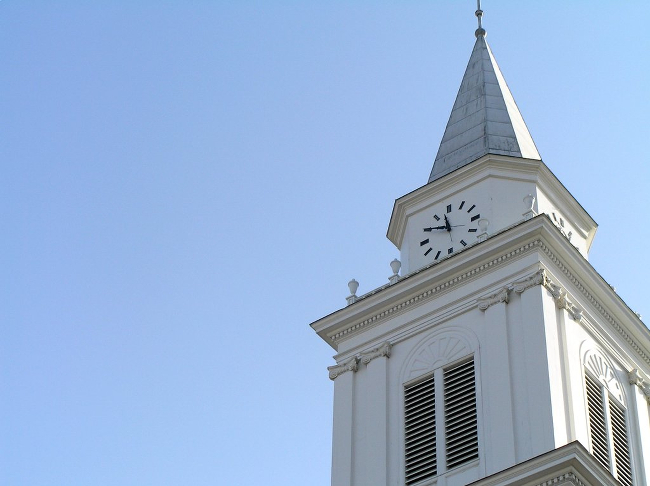Conservative Christianity is another country, one whose citizens are often deeply suspicious of the world beyond its borders. Julie Rodgers’ article in Time last week, in which she shares the story of how Wheaton College hired her to work with sexual minorities on campus and then pressured her to resign after less than a year, illustrates the siege mentality that often prevails in conservative Christian culture.
Rodgers chose to go public in the wake of another controversy at the Illinois college, this one in response to a political science professor’s choice to express solidarity with the Muslim community in the wake of the San Bernadino attacks. That professor, Dr. Larycia Hawkins, was placed on administrative leave in December, and a faculty diversity committee has since concluded that the proceedings against her were discriminatory. Drawing a parallel between Dr. Hawkins’ situation and her own, Rodgers writes, “I can only speculate about why Wheaton has been inconsistent in their treatment of different employees, but one thing is clear: fear makes public perception supremely important.”
In Rodgers’ case, the fear was that she might imply that Wheaton could accept, even celebrate, its gay, lesbian, and bisexual students. Despite agreeing to sign Wheaton’s Community Covenant, which affirms the traditional view that sexual intimacy is reserved for heterosexual marriage, Rodgers still came under scrutiny simply for describing herself as gay. By doing so, she was claiming as a positive identity what many evangelicals insist can only be understood as a sin, and Wheaton’s administration was concerned about pushback from alumni and donors, pushback which eventually led them to encourage Rodgers to resign.
The world of conservative Christianity
For those outside of conservative evangelical communities, the fact that Rodgers was willing to commit to celibacy at all might already seem like an unacceptable compromise, but as she states at the beginning of her article, it was a compromise she was willing to make. The fact that she was prepared to work with an avowedly conservative institution like Wheaton in order to reach its vulnerable queer students speaks volumes about such students’ desperate need for advocates, for safe spaces, for someone exactly like Rodgers to affirm their identities. The fact that Wheaton attempted to provide that, and then took it away, is nothing short of heartbreaking.
One can only hope that the students Rodgers worked with at Wheaton will eventually have a chance to discover the world outside the evangelical bubble, a world full of communities that would accept them without compromise. For those inside the borders of conservative evangelicalism, though, knowing that such communities exist often isn’t enough. Many of Wheaton’s queer students have likely been raised to think that the world outside is corrupt and unsafe, that by venturing into the secular realm they run the risk of losing that which is most precious—their faith.
By staying inside, though, they will be continually forced to make agonizing choices, to suppress parts of themselves if they want to remain acceptable to their families, friends, and churches. Even without advocating anything as radical as same-sex marriage, even by simply reassuring students that identifying as gay was not something to be ashamed of, Rodgers was able to give those students hope that they might not have to choose. Having someone inside their community affirm their right to exist probably meant everything to the students Rodgers worked with, and now that lifeline is gone.
Wheaton’s dangerous message to LGBQT Christians
Worse, Wheaton’s administration has sent the message that non-heterosexual identities are most definitely not acceptable. Even if they were acting on the basis of sincerely held belief—a fact which Rodgers questions, given her willingness to abide by Wheaton’s sexual ethics—their actions have served to reiterate to their students who identify as something other than straight that they will, indeed, have to choose between that identity and their faith community. It’s a choice that many conservative Christian communities force on sexual minorities, one that inflicts irreparable harm on people who deserve better.
This isn’t the first time in recent years that an evangelical organization has attempted to make some slight forward progress on LGBQ issues, only to backpedal in the face of negative reactions. I’m reminded of the World Vision controversy of 2014, in which the evangelical charity changed its employment policies to allow for the hiring of Christians in legal same-sex marriages, and then reversed the policy change within 48 hours after a massive backlash from conservative evangelicals. Whether or not the most vocally homophobic segments of the evangelical community are representative, it’s clear that they’re willing to withdraw their money from causes and organizations they would otherwise support at the first hint of acceptance or even tolerance of sexual minorities. One can only hope that they’re doubling down because they know this is a culture war that they’re ultimately going to lose. In the meantime, though, it’s Wheaton’s queer students who are getting caught in the crossfire.
Image: Stevan Sheets/Creative Commons

